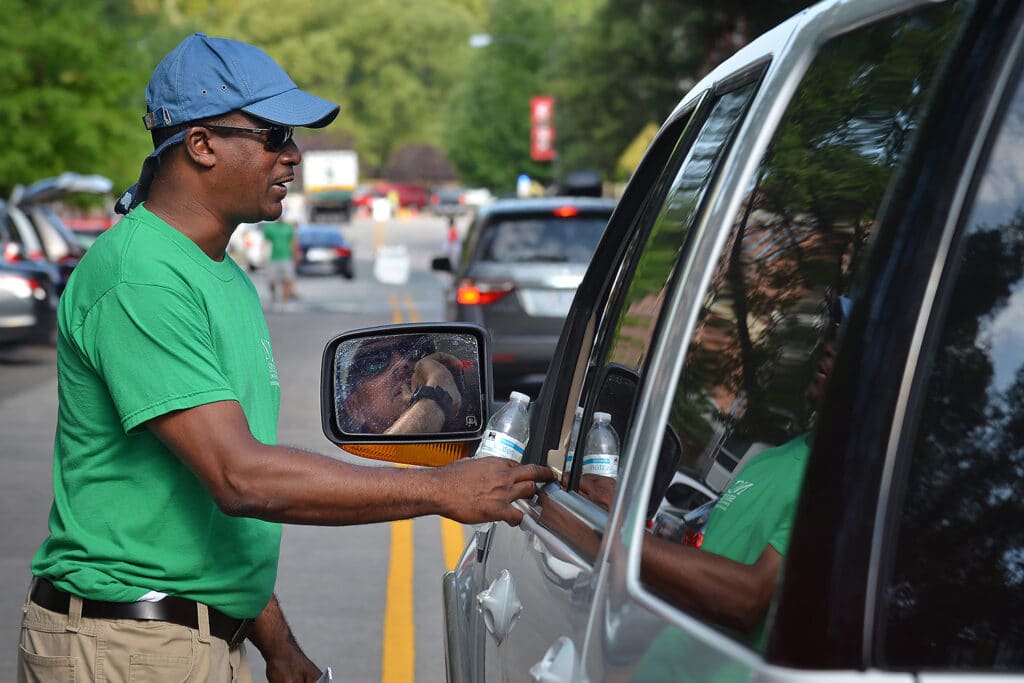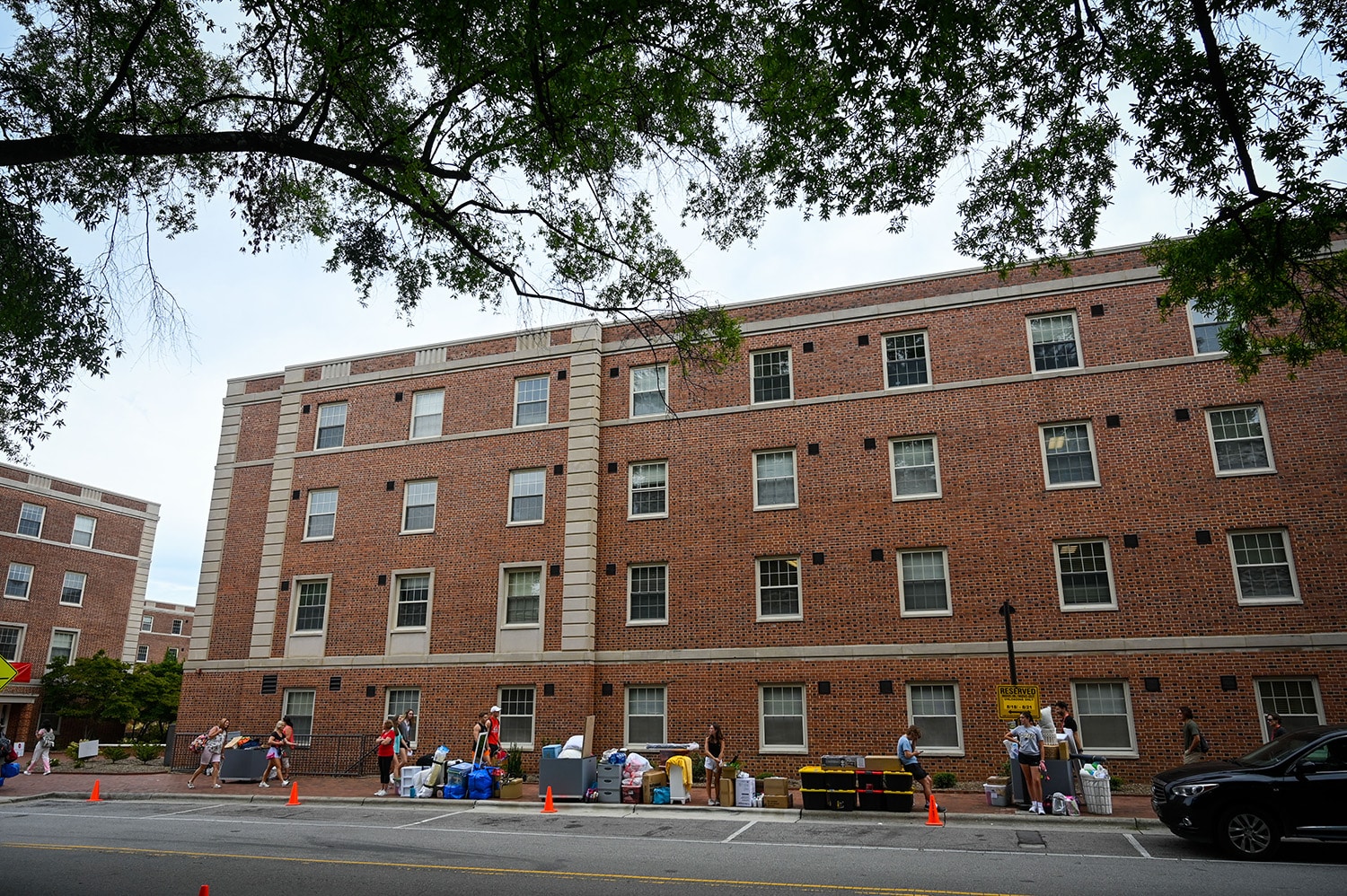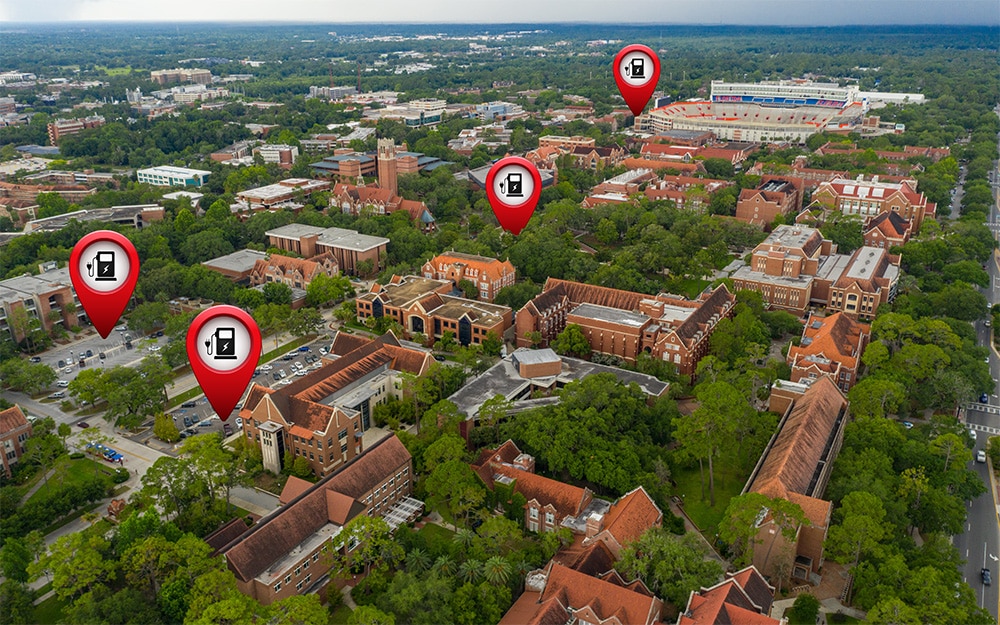
What innovation will have the most significant impact on parking and mobility in the next five years?
Innovations in AI, IoT, and 5G are set to revolutionize
Share:
Share:
Move-in can set the tone for how a student’s year will go and validate that they have made the right choice. This is the student’s last introduction to the campus. Here at North Carolina State University (NC State), we take this responsibility seriously. We have a process in place where several departments work in tandem to make sure that move-in goes smoothly, and to ensure that the students and families have a positive experience.
Over four days in August, about 9,500 students and their families will descend on the NC State campus. They contend with navigating campus and finding their way around despite the weather—North Carolina in August can be extremely hot and unpredictable when it comes to rain.

After the students have been accepted, gone through orientation, and received their housing assignments, they need to get to campus. Part of the planning process involves determining the most efficient routes to the students’ respective residence halls and parking areas. The NC State campus consists of several two-lane roads, so a proper traffic plan must be in place to keep vehicles moving and prevent backups. Keith Piper, NC State Event Parking Coordinator, has been with the university for one year, but before that, he worked for the third-party parking company that staffed the traffic control officers and parking attendants dispersed around campus during move-in. “I did not realize how much collaboration really goes into move-in, and how many different pieces, departments, and people, in general, are working move-in making sure it goes smoothly,” Piper said.
Piper puts together a staffing plan utilizing a third-party parking company, in addition to the NC State Transportation Enforcement Officers and department staff, to help direct traffic and monitor the parking lots. This enables families to get to the appropriate lot to unload their belongings. “One of the biggest challenges was coming up with a parking plan, and a detailed list of responsibilities for each of the different parking staff and team members in the field,” Piper said. “Previously, it was just a short meeting the day of move-in, but this year I went out and created a different parking cheat sheet for team members who are out in the field.” To complement the information provided to staff, a website was created and sent to the students and their families containing downloadable directions to the unloading areas and long-term parking for their residence halls.
“I will say that move-in at NC State has always gone well. Since the start of my tenure, it’s never been a big mess or problem,” Ruppe said. “I think it’s gotten stronger in more recent years, but it’s always been a successful process.”
—Kathleen Ruppe, Director of Housing Operations
Once they are on campus, there are staff members at specific intersections to help guide them to the appropriate location. Vehicle windshields are marked with their building name so that as they are arriving, staff can continue to direct them without having to stop them. At the long-term parking area, 12-foot banners are located at the entrance to the lot as a visual directional cue. All of these steps were taken to keep vehicles moving.
While COVID has forced the university to rethink some aspects of the move-in weekend, the main parts of the process have lasted the test of time. Kathleen Ruppe, Director of Housing Operations, has been at NC State for 19 years and serves as Chair of the Move-In Committee for the university. She has been very happy with the move-in. “I will say that move-in at NC State has always gone well. Since the start of my tenure, it’s never been a big mess or problem,” Ruppe said. “I think it’s gotten stronger in more recent years, but it’s always been a successful process.”

One change instituted in response to COVID regulations and then kept as it benefited the process was the shift to move-in appointments. Before COVID, a schedule was set for an open move-in, now students are given appointment times which regulate and spreads out the traffic. “The biggest change now is that we have appointments. We didn’t do that previously and the pandemic brought about that need—we liked the results,” Ruppe said. “We are keeping with it, as it staggers the arrival times. In the past, they could arrive at any time, and you’d get a big onslaught of people all at once and then it would die down, then another big onslaught.”
Changing to appointments allowed for fewer ebbs and flows and a more consistent arrival status. It was easier to have the right number of staff on hand and to make sure bins and carts were available, so the families aren’t standing around too long waiting to move into rooms. Switching to appointments also allowed us to track the trends for future improvements. “The people like the appointments,” Ruppe said. “A lot of good feedback, not just internally, but from the families who like it compared to years past or other campuses.”
Scott Wallace is the Assistant Director for Housing Facilities and has been at NC State for 14 years. He works closely with Ruppe to create a staffing schedule for the move-in weekend. With all the activity during the weekend, having enough staff, especially in those key, high-traffic areas, is critical to making sure that the process runs smoothly and efficiently. The number of staff needed to run an operation of this size is in the hundreds per day. For the buildings that do not have convenient parking, drop-and-go locations were created, and staff were needed for those areas to be cart runners, unload area management, and watch belongings while vehicles are moved to long-term parking. “Giving folks time slots for move-in, we were able to set the expectations with students and parents to manage these drop-and-go locations. Vehicles pull up, offloading their move-in items, and then park so the next round of vehicles can come and do the same,” Wallace said. “It’s just setting the expectation and managing the drop-off and move process to stay fast and organized. Once they drop off and park their vehicle, they can take as long as they want to unpack in the rooms.”
Wallace also works closely with the General Shop, Transportation and Grounds on the coordination of the “luggage train.” The luggage train runs from the Coliseum Parking Deck to the area called the Tri-Towers. These residence halls are located in an area that has no parking, and can be challenging to access with large amounts of belongings. This operation is overseen by Sarah Ketchem, a 16-year NC State veteran and the Director of Grounds and Building Services within the Facilities department.
Ketchem puts a call out to her staff for volunteers to assist with the luggage train; even though the staff is being paid to assist with student move-in, the luggage train is a volunteer opportunity as they want staff who are excited to welcome the students and their families and make it a fun experience. The volunteers are trained every year to ensure an understanding of procedures and protocols. “We do runs ahead of time to make sure safety is considered,” said Ketchem. “We have established the routes that work the best, and our team works together to test-run these routes: where they’ll pick up student’s luggage from a parking deck, transport it to their residence hall and drop it off, and then additional staff from our team will help them move their belongings into their residence halls,” she said.
“I don’t know why I assumed a massive university would be a mess; yesterday was easy, stress-free (my God taking luggage in moving car/trains—genius). We were all done in three hours—it was MAGNIFICENT!”
When transporting the luggage, Ketchem and her team noticed that it was not always just luggage that needed a little extra help to get to the residence halls. Some of the families had members who couldn’t make the walk for various reasons. One of these employees knew they could help. “We had the trailers that were moving the belongings, but we could not put people in or on them,” Ketchem added. “On his own, this employee decided to get a golf cart and create a shuttle that transported anybody that was not able to make the walk. Just on the fly, he made that happen. It was such a good example of customer service, and added a real value to the program.” The facilities staff has proved themselves to be rock stars with their efforts with the luggage train.
Working in the background is Emergency Management and Mission Continuity. Todd Becker, Emergency Manager, has been with NC State for 19 years. Between 2018 and 2019, his office started activating the Emergency Operations Center (EOC) during move-in. The center monitors all events taking place both related and unrelated to move-in activities and can communicate issues that could impact move-in. Weather conditions are an important factor in North Carolina, and between the meteorology department and individuals with weather-related apps on their phones, there can be confusing messaging being distributed. The National Weather Service has an office on Centennial Campus, and they are used as a resource for severe weather. Their information filters through the EOC, who then serves as one voice communicating to all of the campus with a clear and concise message.
The EOC also allows the campus to better coordinate emergency services for fire and life safety. “Every year we have parents and grandparents helping kids move in, and we get a lot of heat stress-related issues,” Becker said. “One thing that opening the EOC has done is help better coordinate emergency services, whether fire and life safety or health-related. We’re able to get people to those locations quickly, we’re better able to stage resources by having the information come in directly to the EOC,” he added. Having the right partners in the EOC is crucial for effective service. Becker and his team constantly evaluate the makeup of the EOC. For example, they ensure that someone from Facilities and Information Technology is available as building and network issue always pops up at move-in. Having a representative from those departments, among many others, reduces the response times.
The EOC also helps to monitor the traffic on and around campus. Over the last few years, several large off-campus apartment complexes have been built next to campus and those students often move in around the same time as on-campus students. This can have a huge impact on traffic, not just on campus, but within the City of Raleigh. The EOC will reach out to the City of Raleigh for off-campus traffic support and will also work with Student Affairs and Transportation to come up with a plan that does not negatively impact on-campus move-in but still allows the off-campus residents to get to their building as efficiently as possible.
The feedback received from parents is proof that move-in weekend is effective.
“I don’t know why I assumed a massive university would be a mess; yesterday was easy, stress-free (my God taking luggage in moving car/trains—genius). We were all done in three hours—it was MAGNIFICENT!”
“We just wanted to say thank you for a great move-in process at Sullivan Hall today for our first-year student. The whole process was so well-organized, everyone was friendly, and the room was clean! We are truly grateful to everyone that made this experience positive. GO PACK!”
“I just wanted to reach out and say WOOHOO and KUDOS!! The move-in process Thursday was amazing! I really was anticipating it being horrible. Everyone was so helpful and friendly. Thank you for your planning and hard work. It was greatly appreciated, and I didn’t want it to go unnoticed. Thank you, NC State!”
When you receive feedback like this, it’s a pleasant reminder about why we do what we do. ◆
Demar Bonnemere is a Communications Manager for North Carolina State University’s Transportation Department.

Innovations in AI, IoT, and 5G are set to revolutionize

A New Frontier in Sustainability

Charting the Electrification Journey for Academic Campuses.
Parking & Mobility is IPMI’s flagship publication, covering the news, trends, analysis, technologies, and people of the parking and mobility industry, and how it affects and influences communities around the world.
| Cookie | Duration | Description |
|---|---|---|
| cookielawinfo-checkbox-advertisement | 1 year | Set by the GDPR Cookie Consent plugin, this cookie is used to record the user consent for the cookies in the "Advertisement" category . |
| cookielawinfo-checkbox-analytics | 11 months | This cookie is set by GDPR Cookie Consent plugin. The cookie is used to store the user consent for the cookies in the category "Analytics". |
| cookielawinfo-checkbox-functional | 11 months | The cookie is set by GDPR cookie consent to record the user consent for the cookies in the category "Functional". |
| cookielawinfo-checkbox-necessary | 11 months | This cookie is set by GDPR Cookie Consent plugin. The cookies is used to store the user consent for the cookies in the category "Necessary". |
| cookielawinfo-checkbox-others | 11 months | This cookie is set by GDPR Cookie Consent plugin. The cookie is used to store the user consent for the cookies in the category "Other. |
| cookielawinfo-checkbox-performance | 11 months | This cookie is set by GDPR Cookie Consent plugin. The cookie is used to store the user consent for the cookies in the category "Performance". |
| CookieLawInfoConsent | 1 year | Records the default button state of the corresponding category & the status of CCPA. It works only in coordination with the primary cookie. |
| elementor | never | This cookie is used by the website's WordPress theme. It allows the website owner to implement or change the website's content in real-time. |
| viewed_cookie_policy | 11 months | The cookie is set by the GDPR Cookie Consent plugin and is used to store whether or not user has consented to the use of cookies. It does not store any personal data. |
| Cookie | Duration | Description |
|---|---|---|
| _ga | 2 years | The _ga cookie, installed by Google Analytics, calculates visitor, session and campaign data and also keeps track of site usage for the site's analytics report. The cookie stores information anonymously and assigns a randomly generated number to recognize unique visitors. |
| _ga_02PMHW8YWC | 2 years | This cookie is installed by Google Analytics. |
| _ga_LC0QJJHM3J | 2 years | This cookie is installed by Google Analytics. |
| _ga_V9KYTSBYT2 | 2 years | This cookie is installed by Google Analytics. |
| iutk | 5 months 27 days | This cookie is used by Issuu analytic system to gather information regarding visitor activity on Issuu products. |
| Cookie | Duration | Description |
|---|---|---|
| mc | 1 year 1 month | Quantserve sets the mc cookie to anonymously track user behaviour on the website. |
| Cookie | Duration | Description |
|---|---|---|
| ultp_view_1052 | 1 day | No description |
| ultp_view_1058 | 1 day | No description |
| ultp_view_1060 | 1 day | No description |
| ultp_view_1064 | 1 day | No description |
| ultp_view_1068 | 1 day | No description |
| ultp_view_1070 | 1 day | No description |
| ultp_view_1072 | 1 day | No description |
| ultp_view_1078 | 1 day | No description |
| ultp_view_1082 | 1 day | No description |
| ultp_view_1088 | 1 day | No description |
| ultp_view_1100 | 1 day | No description |
| ultp_view_1103 | 1 day | No description |
| ultp_view_1114 | 1 day | No description |
| ultp_view_1118 | 1 day | No description |
| ultp_view_1122 | 1 day | No description |
| ultp_view_1125 | 1 day | No description |
| ultp_view_1130 | 1 day | No description |
| ultp_view_1132 | 1 day | No description |
| ultp_view_1135 | 1 day | No description |
| ultp_view_1541 | 1 day | No description |
| ultp_view_1554 | 1 day | No description |
| ultp_view_1557 | 1 day | No description |
| ultp_view_1560 | 1 day | No description |
| ultp_view_1563 | 1 day | No description |
| ultp_view_1568 | 1 day | No description |
| ultp_view_1572 | 1 day | No description |
| ultp_view_1576 | 1 day | No description |
| ultp_view_1580 | 1 day | No description |
| ultp_view_2305 | 1 day | No description |
| ultp_view_2321 | 1 day | No description |
| ultp_view_2338 | 1 day | No description |
| ultp_view_2342 | 1 day | No description |
| ultp_view_259 | 1 day | No description |
| ultp_view_270 | 1 day | No description |
| ultp_view_275 | 1 day | No description |
| ultp_view_286 | 1 day | No description |
| ultp_view_3074 | 1 day | No description |
| ultp_view_3115 | 1 day | No description |
| ultp_view_3334 | 1 day | No description |
| ultp_view_3336 | 1 day | No description |
| ultp_view_3338 | 1 day | No description |
| ultp_view_3340 | 1 day | No description |
| ultp_view_3346 | 1 day | No description |
| ultp_view_3354 | 1 day | No description |
| ultp_view_3361 | 1 day | No description |
| ultp_view_3367 | 1 day | No description |
| ultp_view_365 | 1 day | No description |
| ultp_view_367 | 1 day | No description |
| ultp_view_38 | 1 day | No description |
| ultp_view_3846 | 1 day | No description |